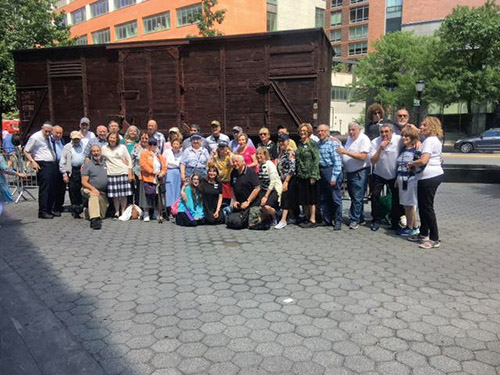


This past Lag B’Omer marked the 13th anniversary of the Naphtali Aron Torah Enrichment Program (NATEP) at Shomrei Torah in Fair Lawn. What began as a once-a-week breakfast and learning session for retirees under its original name of Torah Tuesday has steadily expanded to also include Thursdays, Mondays and, most recently, Wednesdays. For each of those days, an hour or more of learning is divided into two sessions.
What makes the program unique is not just its consistency, longevity and steady expansion, but its reputation for also running educational and entertaining events. Over the years, NATEP has held ping pong tournaments, set up challenge matches with a chess grandmaster, had cooking contests, organized trips to a Jewish museum in Philadelphia and a Jewish chapel at West Point, arranged book signings, attended Yankee games, and more. In almost every instance, the event was accompanied by learning, often related to the venue at hand.
Mendy Aron, overall point person who first proposed a learning program for retirees and later became the driving force behind many of the accompanying events, explained his thought process. “All of our venues contain an element of Torah learning, in keeping with the idea that as Jews, our daily activities should always be infused with Torah and mitzvahs.” As an example, he cited that prior to boarding the bus for a Yankees game, there is a shiur and a barbecue at the shul.
The two most recent NATEP events were no different. On Thursday, June 27, nearly 50 people attended the special Holocaust exhibit at the Jewish Heritage Museum in lower Manhattan. On the bus ride in, Rabbi Benjamin Yudin delivered a dvar Torah on laws concerning a rodef, a person who pursues someone with the intent of killing him. The shiur was dedicated to the memory of Lori Kaye, the woman who was gunned down at Chabad of Poway because she was Jewish.
In its simplest form, if A is running after B, C can do whatever it takes to ensure that A will not harm B. As Rabbi Yudin explained, “Even if B is guilty of a crime and deserves to be killed, we cannot take the law into our own hands.” He went on to cite some of the more interesting examples. For instance, if it is known that a fetus is threatening the life of its mother, it too is considered a rodef and can be killed, since a living mother takes precedence over an unborn fetus. Once the head of the fetus appears, it gets a lot more complicated, since its status has changed from fetus to live person. With the venue for the day focused on the rise of the Nazism and the ensuing death camps, one could see a connection between the learning topic and NATEP activity.
On Sunday, June 30, a special NATEP breakfast was held to commemorate the upcoming 50th anniversary of the Apollo moon landing. After a brief historical discussion of the event, Rabbi Andrew Markowitz delivered a fascinating dvar Torah on whether or not we are obligated to keep mitzvahs on the moon. The monthly blessing on the new moon was an appropriate starting point. From there, Rabbi Markowitz shared various rabbinic opinions, which ran the gamut from having full obligation in all mitzvahs, to being exempt from any time-bound mitzvahs, to having “no obligation whatsoever on a Torah level of any mitzvahs, since they only apply while on earth.”
A related query involved the laws for a Jewish astronaut circling the earth’s orbit. Since he would experience multiple sunrises and sunsets over a 24-hour period, would that obligate him to put on and take off his tefillin every hour and a half or so? And what about Shabbos? When, and how often, would he need to take it in? This led to more earthly discussions about time-related issues in extreme northern lands that can experience a midnight sun. Not surprisingly, it made for a lively discussion.
NATEP learning takes place each week from Monday through Thursday, with breakfast served at 8:45 a.m., following the 7:45 a.m. minyan. Learning begins at 9 a.m. and usually concludes between 10 a.m. and 10:15 a.m.. Both men and women are welcome to attend.
By Robert Isler
Robert Isler is a freelance writer who lives in Fair Lawn. He can be reached at [email protected].










